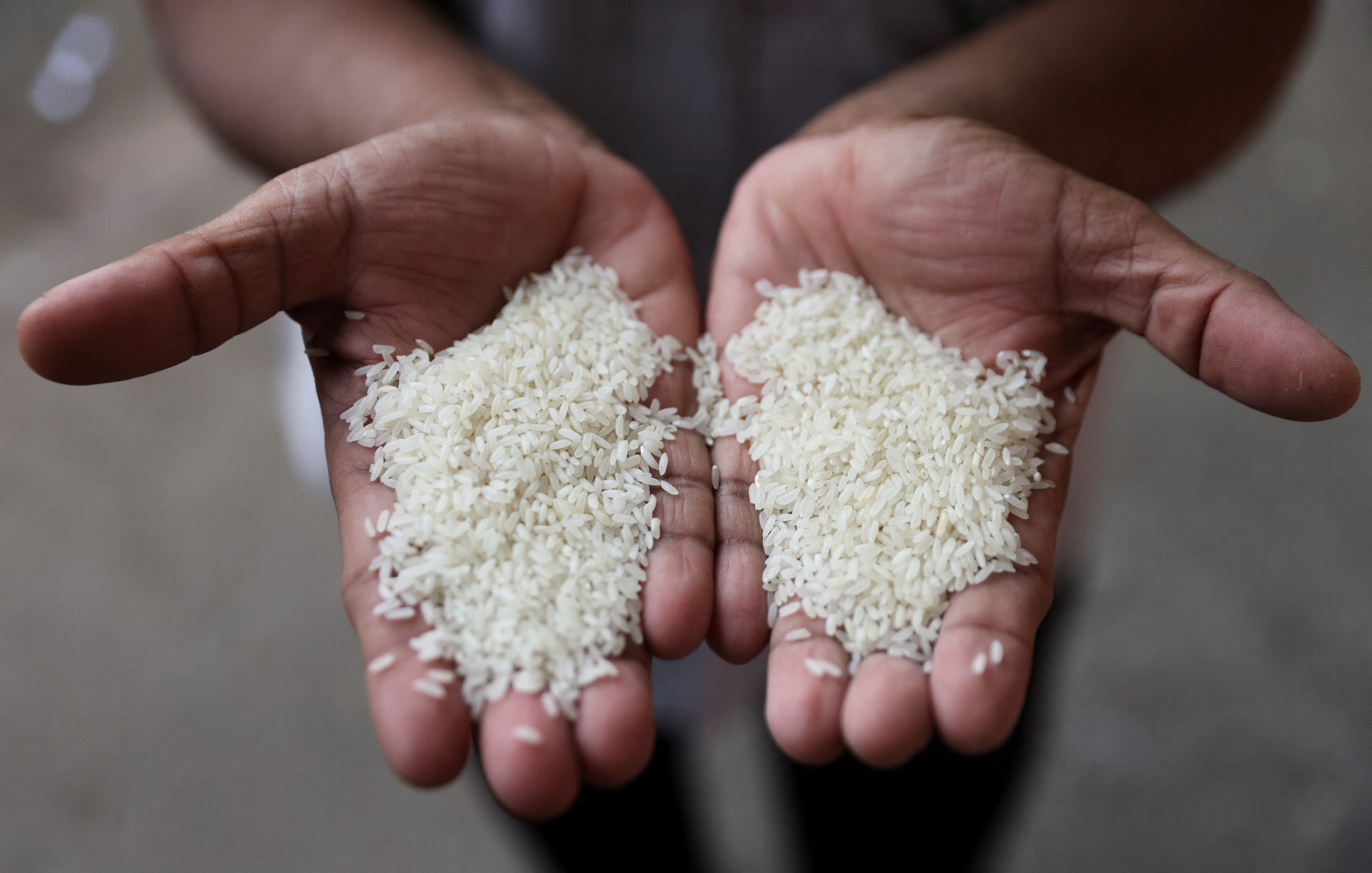[ad_1]

A person compares totally different grains of rice at a wholesale market in Navi Mumbai, India August 4, 2023. REUTERS/Francis Mascarenhas/File Photo Acquire Licensing Rights
SINGAPORE, Aug 31 (Reuters) – Rice costs in key exporting nations together with Thailand and Vietnam have climbed round 20% since India, the world’s greatest shipper of the grain, banned shipments of a key selection in July, tightening international provides.
Traders anticipate related provide curbs by different exporters needing to make sure home meals safety, which has left importers scrambling to safe shipments.
Last 12 months, India banned exports of damaged rice and imposed obligation on shipments of varied grades, ending the worth stability that had lasted for greater than a decade.
Following are key occasions since late July that led to tighter provides.
* July 20 – India halts exports of its largest rice class, a transfer that will roughly halve shipments by the world’s greatest exporter, triggering fears of additional inflation in international meals costs.
* July 21 – Vietnam, the world’s third largest rice exporter, calls on the nation’s meals affiliation to make sure home rice provides are sufficent a day after India introduced its ban.
* July 21 – India’s ban on non-basmati white rice exports leads to the cancellation of contracts to produce round 2 million metric tons to the world market.
* July 27 – Prices of rice exported from Vietnam and Thailand soar to their highest in additional than a decade as India’s export curbs spark worries about provide.
* July 28 – India restricts exports of deoiled rice bran, used within the cattle feed trade, till Nov. 30.
* July 28 – The United Arab Emirates bans rice exports and re-exports for 4 months, together with rice of Indian origin.
* July 29 – Philippine President Ferdinand Marcos Jr. says the nation should boost its rice shares and that he could search a provide cope with India, anxious concerning the potential affect of El Nino dry climate on the native harvest and about different suppliers.
The Philippines is the world’s second-largest rice importer.
* Aug 1 – Rice exporters in Thailand and Vietnam, the second and third greatest exporters, start re-negotiating costs on gross sales contracts for round half one million metric tons for August cargo.
* Aug 4 – The United Nations meals company’s rice worth index rises 2.8% in July from a month earlier to its highest stage in practically 12 years.
* Aug 7 – The Philippines says it could prolong diminished import tariffs on rice and different commodities past 2023 to ease strain on inflation.
* Aug 11 – Retail costs for imported and domestically produced rice within the Philippines have risen by 4% to 14% in round two weeks, authorities information exhibits, as international and home farmgate costs soared, including strain on meals inflation.
* Aug 16 – The Philippines’ Department of Agriculture recommends further rice importation of about 500,000 metric tons to cowl potential crop losses from the El Nino dry climate circumstances.
* Aug 16 – Vietnamese exporters renegotiate greater costs for round half one million metric tons of rice.
* Aug 18 – Data exhibits that Indian farmers have planted 36.1 million hectares (89.2 million acres) with rice, up 4.3% on the identical interval final 12 months, as ample monsoon rains in July and better costs increase acreage.
* Aug 21 – Indonesia’s state meals procurement agency Bulog says it’s seeking to import rice from Cambodia and Myanmar to high up authorities shares, anticipating output disruptions as a result of El Nino climate sample.
* Aug 25 – Myanmar plans to quickly prohibit rice exports to manage rising home costs.
* Aug 25 – India imposes a 20% obligation on exports of parboiled rice, which accounts for 30% of the nation’s rice exports.
* Aug 27 – India imposes a $1,200 per ton minimal export worth on basmati rice shipments.
* Aug 29 – India’s export obligation on parboiled rice prompts consumers and sellers to postpone shipments of round 500,000 metric tons to after mid-October.
* Aug 30 – India permits merchants to ship out non-basmati white rice cargoes that have been caught at ports when India imposed its export ban.
Reporting by Naveen Thukral; Editing by Simon Cameron-Moore
Our Standards: The Thomson Reuters Trust Principles.
[adinserter block=”4″]
[ad_2]
Source link